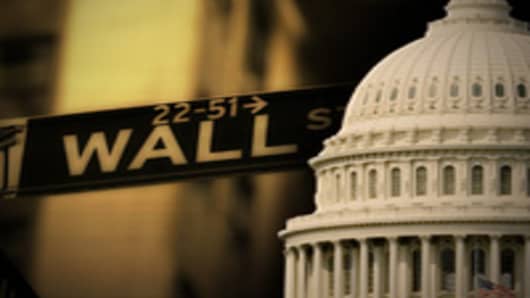On both sides of the political aisle, too big to fail appears to be a matter of too little to succeed.
Some fear the bill will wind up giving preferential treatment to big firms, while others worry that the American taxpayer will remain on the hook, much in the way it happened with the near failure of AIG and others in 2008.
Sen. Richard Shelby (R-Ala.) told colleagues on the floor that he wants to “reshape it [the bill] so it actually ends bailouts,” because, as currently written, “it will help the big banks get bigger,” and “help the likes of Goldman [Sachs] ”.
Sen. Barbara Boxer (D-Calif.) has submitted a succinct three-paragraph amendment that would ensure “no taxpayer funds could be used to bail out financial institutions.” That amendent is expected to be voted on Tuesday.
For many politicians, when it comes to the reform bill, as with the financial crisis of 2008-2209, it is the bailout concept that resonates most with their constituents. It is the big ticket item that stays with you.
The concern, however, is more than election-year politics and semantics. Even some in the banking industry don’t think the provisions make sense.
“This is not a Democrat-Republican issue. Everyone seems to think this is a bad idea,” says Frank Sorrentino, chairman and CEO of North Jersey Community Bank, a state-chartered institution with $500 million in assets. “It won’t work. Who’s going to decide? Who’s going to pay if we do have a failure?”
It is somewhat unusual for such a key component in a piece of legislation as major as this to draw such bipartisan criticism, especially after months of discussion and negotiation between the two parties.
Supporters of the bill say it has all the right elements and addresses the right issues, from increased capital requirements and risk management plans to an early wanring detection system to liquidation and break-up powers.
“If this works, resolution should rarely if ever happen,” says Sen. Mark Warner (D-Vir.), who along with fellow banking committee member Bob Corker (R-Tenn.) was a key author of the too-big-to-fail section of the bill.
For many skeptics, however, too big to fail in the future is not a matter of if but who and when.
“What it [the bill] tries to do is manage too big to fail," not prevent it, says Calabria.
Some on Capitol Hill want to be more proactive.
Democratic Senators Sherrod Brown of Ohio and Ted Kaufman of Delaware have introduced a billwhich they hope to make an amendment to the Dodd bill that would essentially cap the size of the biggest institutions.
“I want to deal with the too-big part of too big to fail," Kaufman told CNBC Monday. “I would shrink the size, make sure they have enough capital, that they don’t have too many non-deposit liabilities and that they're not over-leveraged."
The amendment—co-sponsored by seven other progressive Democrats and one independent, Bernie Saunders of Vermont—would impose a strict 10-percent cap on any bank-holding-company’s share of the nation’s total insured deposits, It would also limit the size of non-deposit liabilities and leverage ratios.
Though the 10-percent limit currently exists, it can be waived by regulators.
“We’re passing the buck,” says Kaufman, adding there’s little Congress can do if “regulators don’t want to regulate.”
Other possible amemdments directed at the size and risk posture of financial firms include one by Maria Cantwell (D-Wa.) and John-McCain (R-Ariz) which would reinstate the Glass-Steagall Act of 1933 that separated the commercial and investing banking activitieof firms.
Another, by Carl Levin (D-Mi.) and Jeff Merkley (D-Ore.) would essentiallymake the so-called Volcker rule legaland restrict the proprietary trading activities of Wall Street fims.
Jim Bunning (R-Ky.) plans to introduce an amendment that would update current bankkruptcy laws to accomodate big financial firms. "Bankruptcy provides certainty," he said on the floor Monday.
There is also residual support for a pre-paid bank fund, a rainy day fund, to help cover the costs of any firm in trouble.
For awhile there was a chance the Senate version would inclide a $50-billion fund—vs. a $150 billion one in the House version—but that is not in the Dodd draft, althogh people like Kaufman the senator and Sorrentino the banker support it.
“When we're going to wind down a trillion-dollar institution, who is going to pay for it,” asks Sorrentino. “I say come up with an assessment formula based on the size and portfolio of risk.”
“I think the fund is a darn good idea,” says Kaufman, “I also think the Ammerican people would like to see it happen.”
How far any of these measures get is unknown at this point, but the betting money says they’re longshots. A bailout fund of any size, for instance, is probably off the table now, sources say.
At the outset of the debate late last week, banking chairmnan Chris Dodd (D-Conn.) told the Senate he is “confident we can end too big to fail,” Then, in what has already proven to be a very big under statement, he added. “There is no disagreement on what we are trying to achieve, but there will be in certain areas on how best to do it.”



